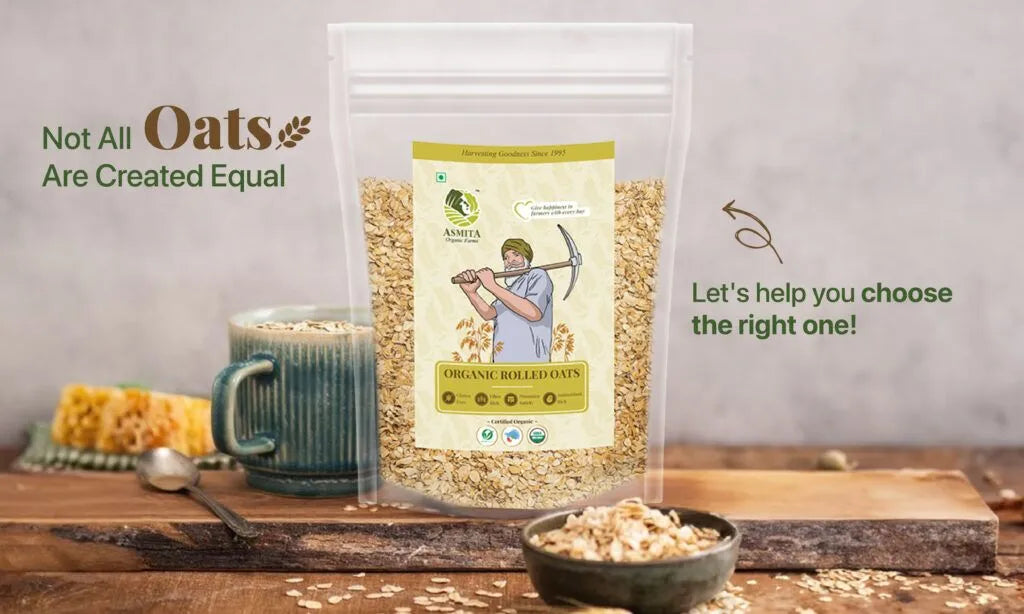Rolled Oats Vs Normal Regular Oats & More: Which Is Better?
Info Organic 5 min read
In today's modern life, finding time to eat healthy food can feel like an uphill battle. But rolled oats have simplified our journey to wellness!
Transformed into crunchy, nutritious flakes that require minimal effort to prepare, rolled oats offer a convenient food option to working-class people. They are packed with fiber, keeping you feeling full and satisfied for hours on end.

Rolled oats are incredibly versatile, you can enjoy a creamy bowl of overnight oats or baked into crunchy granola bars.
But what makes rolled oats stand out from the crowd of breakfast cereals? How are they different from regular oats? Let's find out all about the differences in rolled oats, quick oats, steel cut oats, instant oats, and normal oats in this blog post.
Table of Contents:
- What are Rolled Oats?
- How to Make Rolled Oats at Home?
- Are Rolled Oats Healthier Than Normal Oats?
- Rolled Oats Versus Other Common Oat Varieties
- How To Cook Rolled Oats And Its Popular Recipes
What are Rolled Oats?
Rolled oats, also known as old-fashioned oats, are a versatile and nutritious food in many kitchens worldwide. They begin their journey as oat groats, which are the whole grains of oats. These oat groats undergo a process of steaming and then rolling, which gives them their distinctive flattened shape and texture.
The process of rolling oats involves steaming the oat groats to make them soft. Then, they are passed through rollers that flatten them into flakes. These flakes vary in thickness, with some being thinner and others thicker, depending on the desired final product.
One of the key health benefits of rolled oats is their retention of much of their original nutritional value. Unlike highly processed oat products like instant oats, rolled oats maintain their essential nutrients.
They are a rich source of dietary fiber, particularly beta-glucan, a type of soluble fiber known for its cholesterol-lowering effects.
Rolled oats are also a good source of complex carbohydrates, providing sustained energy release throughout the day.
Additionally, they contain important vitamins and minerals such as iron, magnesium, phosphorus, and B vitamins, contributing to overall health and well-being.
Rolled oats can even be ground into healthy oat flour for use in gluten-free baking or as a thickening agent in soups and stews. Rolled oats offer a convenient, nutritious, and delicious food option for breakfast and beyond.
How to Make Rolled Oats at Home?
Wondering how to make rolled oats at home for quick food? It is surprisingly simple and requires just a few steps:
Start with Whole Oat Groats:
Purchase whole grain oat groats from your local grocery store or bulk food supplier. These are the unprocessed oat grains that will be rolled into oats.
Steam the Oats:
Place the oat groats in a steamer basket over boiling water. Steam them for about 45 minutes to soften them slightly. This step helps to make the oats easier to roll.
Dry the Oats:
Spread the steamed oat groats out on a baking sheet in a single layer. Allow them to air dry for several hours or overnight until they are slightly dry to the touch. This drying process is important for achieving the right texture when rolling the oats.
Roll the Oats:
Once the oat groats are dry, you can roll them using a rolling pin or a specialised oat roller. Simply place a small portion of the oat groats on a flat surface and roll over them until they flatten into flakes.
Store the Rolled Oats:
Once rolled, store the oats in an airtight container in a cool, dry place. They will keep for several months.
That’s it! You now have homemade rolled oats ready to be cooked. If you want to get ready to eat rolled oats for convenience, you can simply place your order on our online organic shopping website.
We specialise in sourcing all our food ingredients organically for better quality and nutrient levels.
Are Rolled Oats Healthier Than Normal Oats?

So, what’s better in rolled oats vs normal oats? Both rolled oats and "normal" oats are healthy and offer excellent nutritional benefits. The primary difference in rolled oats vs normal oats lies in their processing.
Rolled oats are steamed and then flattened into flakes, which makes them cook faster and have a softer texture compared to steel-cut oats or whole grain-oat groats.
Rolled oats still retain their fiber, protein, vitamins, and minerals in the process, making them a nutritious choice.
Steel-cut oats and whole grain oat groats have a chewier texture and may take longer to cook compared to rolled oats.
In essence, both rolled oats and "normal" oats offer similar health benefits, including soluble fiber, protein, and essential nutrients. Let’s take a closer look at instant vs rolled oats and a comparison with other varieties.
Rolled Oats Versus Other Common Oat Varieties
Rolled Oats Vs Normal Oats:
Oats and rolled oats are often used interchangeably, but oats refer to the whole oat groats, while rolled oats are oat groats that have been steamed and rolled flat.
Oats rolled cook faster and have a softer texture compared to whole oat groats, but both foods offer similar nutritional benefits, including fiber, protein, and essential nutrients.
Quick Oats Vs Rolled Oats:
When we compare rolled oats vs quick oats , we can find differences in their form. Quick oats are rolled into thinner flakes and often cut into smaller pieces, resulting in a quicker cooking time.
While both foods offer the same benefits, quick oatmeal cooks faster and has a slightly smoother texture compared to traditional rolled oats.
Rolled Oats Vs Steel Cut Oats:
Oats rolled and steel-cut oats come from the same whole grain oat groats but undergo different processing methods. Rolled oats are steamed and rolled flat, while steel-cut oats are simply chopped oat groats.
Steel-cut oats have a chewier texture and longer cooking time compared to rolled oatmeal, but both provide similar nutritional benefits, including fiber, protein, and vitamins.
Instant Oats Vs Rolled Oats:
When comparing rolled oats vs instant oats, know that both are rolled but differ in processing and texture. Instant oats are pre-cooked, dried, and often further processed into smaller pieces, allowing food to cook quickly with just hot water or a microwave.
While convenient, instant oatmeal may have a slightly softer texture and slightly lower nutritional value compared to traditional rolled oats.
How To Cook Rolled Oats And Its Popular Recipes
Cooking rolled oatmeal is a breeze and offers versatility for creating delicious and nutritious food. Here's simple guide on how to cook rolled oatmeal and some popular recipes to try:
How to Cook Rolled Oats:
-
Basic Rolled Oats:
- In a saucepan, bring water or milk to a boil. Stir in rolled oats and reduce the heat to medium-low.
- Cook for about 5-7 minutes until the oats are tender and the desired consistency is reached. Add sweeteners, fruits, nuts, or seeds according to your preference.
-
Overnight Rolled Oats:
- In a bowl or jar, combine rolled oats with water, milk, yogurt, or dairy-free alternatives in a 1:1 ratio.
- Add sweeteners, spices, fruits, nuts, or seeds as desired. Stir well, cover, and refrigerate overnight. In the morning, give the oatmeal a good stir and enjoy the food cold or gently heat them before serving.
-
Baked Rolled Oatmeal:
- Preheat your oven to 350°F (175°C).
- In a mixing bowl, combine rolled oats, milk, eggs, sweetener, spices, fruits, nuts, or seeds.
- Pour the mixture into a greased baking dish. Bake for 30-35 minutes or until the oats are set and the top is golden brown. Serve warm, topped with additional toppings if desired.
Popular Rolled Oats Recipes:
Here’s how to cook rolled oats in different easy to enjoy varieties in food.
-
Classic Oatmeal: Add more taste to your basic rolled oatmeal with toppings like maple syrup, cinnamon, fresh berries, sliced bananas, chopped nuts, & a dollop of nut butter for a comforting and nutritious breakfast.
-
Oatmeal Cookies: Combine rolled oats with the flour, sugar, butter, eggs, and flavourings like vanilla and cinnamon to make delicious oatmeal cookies. Add chocolate chips, raisins, or nuts for extra flavour and texture.
-
Granola: Mix rolled oatmeal with honey, oil, and your favourite nuts, seeds, and dried fruits. Spread the mixture onto a baking sheet and bake until golden brown and crunchy for homemade granola perfect for breakfast or snacking.
-
Oatmeal Pancakes or Waffles: Substitute some of the flour in your pancake or waffle batter with rolled oatmeal for a wholesome twist. Serve with fresh fruit and a drizzle of syrup for a delightful breakfast treat.
-
Oatmeal Smoothies: Blend rolled oatmeal with milk, fruits, and cocoa powder for a nutritious and filling breakfast smoothie.
With these simple cooking methods and popular recipes, you can make the most of rolled oatmeal and enjoy delicious, wholesome food every day.
Conclusion
Rolled oats offer a convenient and nutritious foundation for a variety of delicious foods. Rolled oatmeal is a staple ingredient for busy individuals seeking easy, wholesome eating options.
Whether enjoyed as a warm bowl of oatmeal, a crunchy granola topping, or used in creative recipes like cookies and pancakes, rolled oats provide an easy way to a healthy food. We work closely with small farmers across India and use only sustainable farming practices to grow the most nutritious organic food products for you all.
Rolled Oats - FAQS
Are rolled oats gluten-free?
Rolled oats are naturally gluten-free, but cross-contamination during processing can occur. Cook for certified gluten-free rolled oats.
Can I eat rolled oats raw?
While you technically can eat rolled oats raw, they may be harder to digest and less palatable. Overnight oats are a popular way to enjoy rolled oats without cooking them and become more digestible.
Are rolled oats and instant oats the same?
Rolled oats and instant oats are both healthy foods and processed from oat groats, but instant oats take less cooking time. Rolled oats retain more texture and flavour compared to instant oats.
How long do rolled oats last?
Properly stored rolled oats can last for up to 1-2 years in an airtight container in a cool, dry place.

